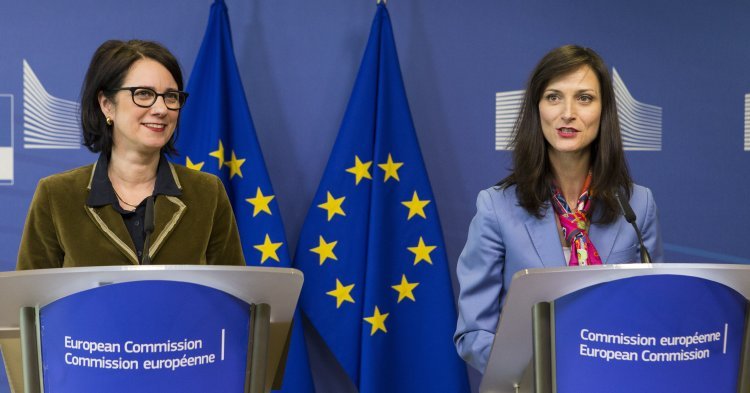“The unprecedented situation which we are living in is so worrying that we are investing significant resources in order to ensure the following: it is necessary that in the May 2019 elections citizens vote without being swayed by any kind of manipulation." Contacted by phone, the spokesperson of the Representation of the European Commission in France, Guillaume Roty, did not hide his concern in light of the May elections which will renew MEPs and then Commissioners and their cabinets.
He pointed out that “all evidence demonstrates that misinformation campaigns come from Russia.” Faced with this threat, the European Commission has deployed its “anti-fake news shield”. Actually, the institution prefers to use the term “disinformation”, which it defines as “spreading verifiable information as false in the context of a certain economic or political agenda."
In its arsenal, the European External Action Service (EEAS) is in charge of identifying misinformation campaigns and has recently seen its budget more than double. Indeed, the budget rose from 1.9 million euros in 2018 to 5 million euros in 2019. Most notably, this call to arms also includes the recruitment of Russian and Ukrainian speaking staff.
The European Commission knows that the odds are not in its favour. Brussels has estimated that every year, Moscow directs one billion euros of its funds to pro-Kremlin media. Moreover, we also know that just a few thousand euros are more than enough for Russian fake news agencies and troll factories to be fully functional. According to Andrus Ansip, Vice President of the European Commission, “misinformation is part of Russia’s military doctrine and its strategy to divide and weaken the West.”
Google, Facebook and Twitter have committed to following a code of good conduct
An efficient response would require a better coordination between member states. Indeed we are awaiting the creation of “the early warning system” in May which will identify and report disinformation campaigns. Another challenging strategy consists in helping citizens become aware of false information through events such as the European Media Literacy Week in March or via the dedicated “EU vs Disinfo” website.
Guillaume Roty explained that "the main objective consists in establishing a code of good conduct thanks to which platforms will have to comply with their responsibilities.” After all, Google, Facebook and Twitter all have different, non-binding commitments. It is up to them to take the necessary steps to tackle fake accounts and bots, to clarify matters with Internet users who finance sponsored ads, and maybe even to attack the business model of websites which thrive on disinformation.
The Commission intends to take stock of the goodwill displayed by the platforms. The Commission certainly has not forgotten YouTube’s campaign where stars shared false information attacking Article 13 of the EU’s copyright directive. With regard to this incident, Guillaume Roty diplomatically stated that “there is a need to clarify where the message came from". Ultimately, two questions must be answered: whether these platforms play the game, and whether merely playing the game is enough. Guillaume Roty suggests using the threat of legal consequences in case of failure.
Facebook is in the spotlight as well, ever since the US 2016 presidential election which was riddled with suspicions of Russian interference – characterised by the purchase of certain advertisements and the creation of content whose aim was to influence public opinion and fuel tensions within American society. Mark Zuckerberg, Facebook’s chairman, wrote an op-ed in which he tried to clarify his business model, publishing the article on several European newspapers towards the end of January. He wrote that ’another question is whether we leave harmful or divisive content up because it drives engagement. We don’t.’ He also admitted that ’the only reason bad content remains is because the people and artificial-intelligence systems we use to review it are not perfect—not because we have an incentive to ignore it. Our systems are still evolving and improving.’
Candidates who slip under the anti-fake news radar
The European Commission’s response comes in the wake of the European Parliament’s bid in January 2018, through which it called on the EU to flex its muscles in light of Russia’s propaganda. MEPs denounced the increase in “information leaks, disinformation and disinformation campaigns” since the beginning of the war in Ukraine. They also stressed “Russian interference in Brexit and in recent elections in France, Germany and Spain”.
In France, Emmanuel Macron’s anti-fake news laws strongly condemned the “lying propaganda” present in Russian media such as Sputnik and RT throughout the weeks leading up to his election. Going back to France, in light of future election campaigns, judges and the Superior Council of the Audiovisual have been legally endowed with the power to impose sanctions. These two actors may exercise this power when faced with certain platforms and media which propagate “fake news which may negatively affect public order or the transparency of a ballot.” The first time that this law could be applied would be in May, with the European elections.
Still, all these provisions – European or French – can limit certain publications which are merely dedicated to satire or honest opinions. Moreover, a problem will arise if political candidates themselves develop false information in their own speeches or on their own social media accounts. Their supporters will spread this information throughout the web and through endless mail loops, without being particularly worried about the matter. Indeed, laws do not tend to occupy themelves with these issues, as long as the false information does not represent a grave offence which includes insults, defamation, incitement to racial hatred, and the justification of terrorism.
The so called Big Four tech companies impose the abovementioned restrictions as well. In their terms of use, Google, Amazon, Facebook and Apple also prohibit all types of violent and hateful content.
According to a Eurobarometer survey, 37% of Europeans who took part in it stated that they read or see fake news almost every day. 8 out of 10 Europeans believe that this kind of content is a danger to democracy today.



Follow the comments: |
|
